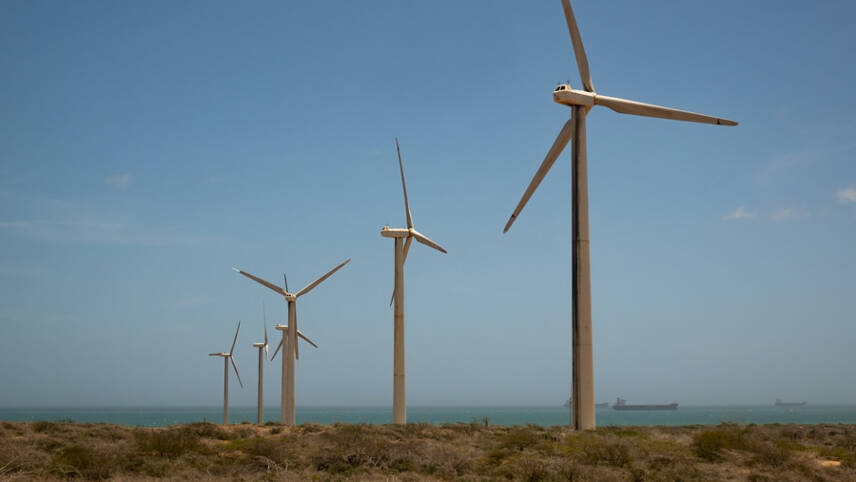Register for free and continue reading
Join our growing army of changemakers and get unlimited access to our premium content

Pictured: Wind turbines in La Guajira, Colombia
That is the warning from Bloomberg NEF as it releases the 2022 edition of its annual Climatescope survey, which tracks the energy transition globally in terms of policies, pipelines and actual installed capacity additions. The publication ties in with the energy-themed day on the COP27 Presidency agenda for Sharm El-Sheikh.
The publication reveals that 92% of developing nations now have time-bound targets to increase renewable energy generation and consumption. This is up from 82% in 2021 and 67% in 2019. A total of 107 developing and emerging markets are covered in the analysis.
BNEF has listed several possible drivers for target setting, including a desire to show leadership and progress at UN climate summits; a need to meet updated national climate migitation targets; improving energy security or simply building a more affordable energy system. On this latter point, a 2021 publication from IRENA stated that renewables are now the cheapest source of power worldwide.
Despite the dial moving on top-line ambition, Climatescope’s findings indicate that many governments in developing nations are not yet making all the key policy changes necessary to deliver new targets.
Only 30% of these countries have established feed-in-tariffs (FITs), for example. FITs provide guaranteed, above-market price guarantees to renewable energy producers, usually over a period of more than a decade. This stimulates investment.
As another example, 47% of these nations do not have net metering – a mechanism by which solar energy system owners and operators are paid for the electricity they supply to the grid. Progress in implementing FITs and net metering globally has proven slow this past year.
Climatescope also reveals that 56% of the 107 markets now have commitments to hold reverse auctions for clean power delivery contracts, similar to the UK’s Contracts for Difference (CfD) rounds. While the number of nations making these commitments is growing steadily, BNEF has expressed concerns that some countries are making these pledges then failing to execute on such auctions.
“Without supporting regulations, policy implementation alone cannot guarantee that a country attracts the amount of investment needed to kick off its energy transition,” said Climatescope’s project manager Sofia Maia.
The report notes that just 9% of the renewable energy capacity installed globally in 2021 was installed in the Middle East and North Africa. The proportion is even lower for Sub-Saharan Africa. In comparison, 45% was installed in Europe. Climatescope names several of the most attractive markets in the Global South as South and Latin American nations. Markets highlighted include Chile, Colombia and the Dominican Republic.
The International Energy Agency (IEA) stated in the summer of 2021 that $1trn will need to be invested annually in clean energy in developing economies by 2030. In comparison, $150bn was invested in 2020. This was around one-fifth of the global total for that year.
AJAETI
In related news, the COP27 Presidency is today (15 November) launching the Africa Just and Affordable Energy Transition Initiative (AJAETI). The initiative will run through to at least 2027 and is being supported by IRENA, the IEA, Sustainable Energy For all and Boston Consulting Group.
Its primary objectives are facilitating affordable energy for at least 300 million people in Africa, primarily those in Sub-Saharan Regions; providing universal access to clean cooking fuels and increasing the share of renewable electricity generation in the mix by 25%. Africa’s power sector should be “based on renewables” by the time this decade closes, the initiative states.
We will get more information on which African nations will participate and which will lead initial workstreams later. The first workstream will be mapping out, aligning, and, where necessary consolidating existing programmes and initiatives. Implementation practices will be finalised next year.
Elsewhere, the European Investment Bank (EIB) has announced a tie-in with Allianz GI to provide $100m to the Emerging Market Climate Action Fund – $75m from the former and $25m from the latter.
The Fund will finance clean energy projects in the Middle East, North Africa, Eastern Europe and Asia. Its main focus areas are onshore wind and solar, but investments will also be permitted for battery energy storage, hydropower and biomass.


Please login or Register to leave a comment.